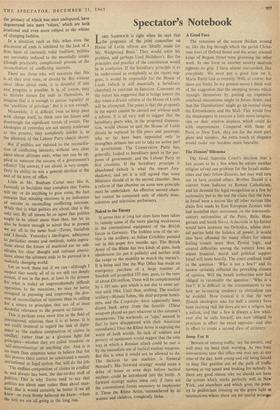Spectator's Notebook
LORD SANDWICH is right when he says that
the proposals of the joint committee on House of Lords reform are 'ideally made for Mr. Wedgwood Berm.' They would solve his problem, and perhaps Lord Hailsham's. But the principles and practice of the constitution would be in confusion. If the hereditary principle is to be undermined as completely as the report sug- gests, it would be impossible for the House of Lords (which is still essentially a hereditary chamber) to continue to function. Comment on the report has suggested that it brings nearer the day when a drastic reform of the House of Lords will be attempted. The point is that the proposals in the report cannot be carried out without such a reform. It is all very well to suggest that the hereditary peers who, in the proposed dispensa- tion, would choose to quit the House of Lords should be replaced by life peers and peeresses, who so far have been appointed only to strengthen debates but not to take an active part in government. The Conservative Party has, generally, looked to hereditary peers in the pur- poses of government, and the Labour Party to first creations. If the hereditary principle is abandoned (which is what the report fore- shadows), and yet it is still agreed that some Ministers should sit in the second chamber, then a reform of that chamber on some new principle must be undertaken. An effective second cham- ber cannot be composed only of elderly dons, scientists and television performers.




























 Previous page
Previous page